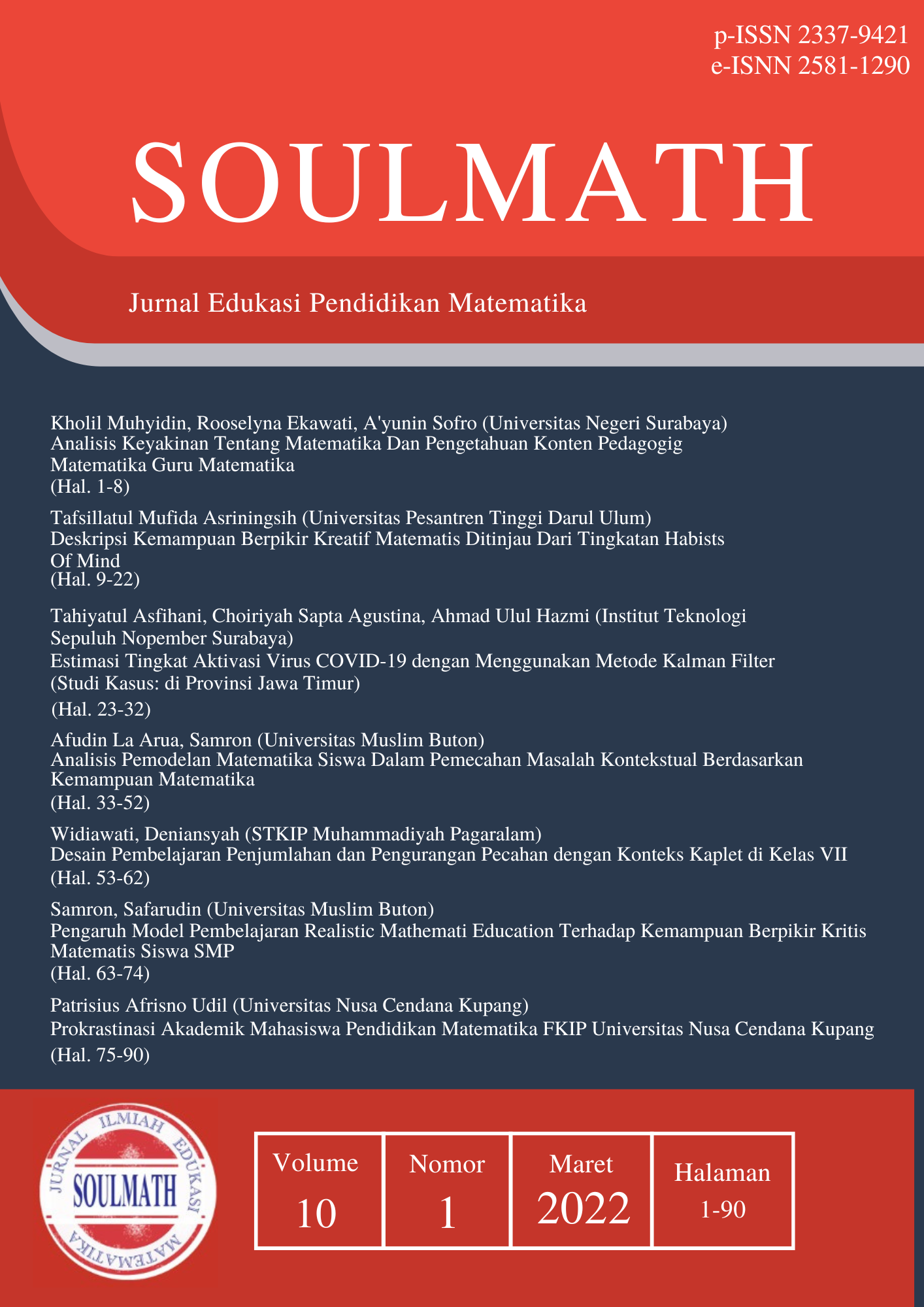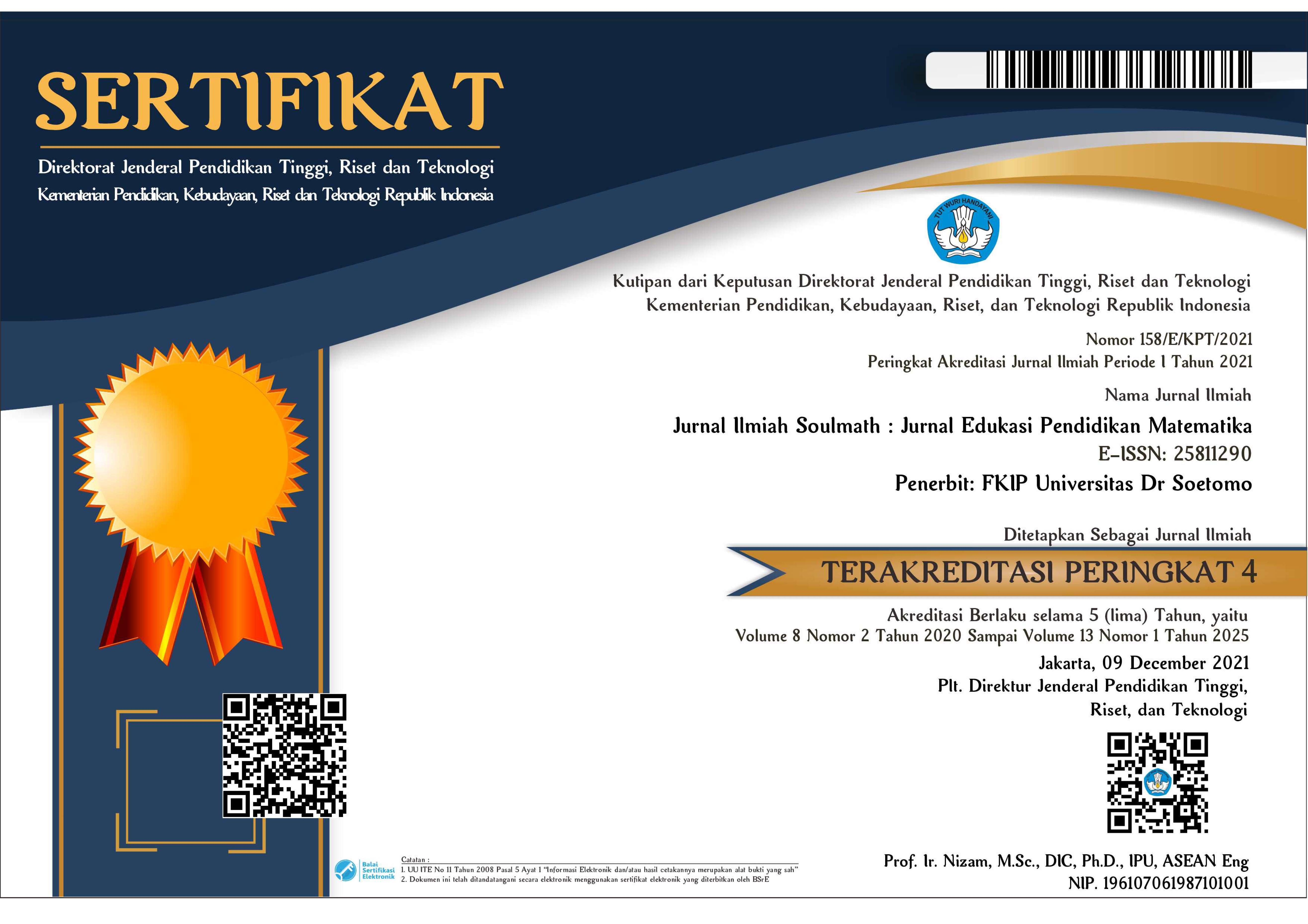Deskripsi Kemampuan Berpikir Kreatif Matematis Ditinjau dari Tingkatan Habits of Mind
 Abstract views: 338
,
Abstract views: 338
,
 2869 publish (Bahasa Indonesia) downloads: 346
2869 publish (Bahasa Indonesia) downloads: 346
Abstract
Abstract
The purpose of the study was to describe students' mathematical creative thinking abilities based on different levels of Habits of Mind (HoM). This research was a qualitative descriptive study. The research subjects consisted of one student with a moderate level of HoM and one student with a low level of HoM. Both subjects were in VII grade of junior high school. Data collection was carried out using the HoM questionnaire technique, open ended tests on geometry, and interviews. The results showed that the highest criteria of creative thinking that met by students with moderate levels of HoM were fluency and flexibility, but did not meet the novelty criteria. While students with low levels of HoM do not meet all the criteria of creative thinking.
Keywords: creative thinking ability, habits of mind, open ended, geometry
Downloads
References
BSNP, Permendiknas RI No. 22 Tahun 2006 tentang Standar Isi untuk Satuan Pendidikan Dasar dan Menengah. Jakarta, 2006.
R. Leikin, “The Education of Mathematically Gifted Students : Some Complexities and Questions,†vol. 8, no. 1, 2011, [Online]. Available: https://scholarworks.umt.edu/cgi/viewcontent.cgi?article=1211&context=tme.
B. Miri, B. C. David, and Z. Uri, “Purposely Teaching for The Promotion of Higher-Order Thinking Skills: A Case of Critical Thinking,†Res. Sci. Educ., vol. 37, no. 4, pp. 353–369, 2007, doi: 10.1007/s11165-006-9029-2.
L. G. Snyder and M. J. Snyder, “Teaching Critical Thinking and Problem Solving Skills,†Delta Pi Epsil. J., vol. 50, no. 2, pp. 90–99, 2008, doi: 10.1177/0021955X7000600203.
C. Wulanjani and I. N. Parta, “Identifikasi Profil Soal Ujian Nasional Matematika SMA IPA Berdasarkan Keterampilan Berpikir Tingkat Lebih Tinggi,†in Prosiding Seminar Nasional Pendidikan Matematika dengan Tema Pengembangan 4C’s dalam Pembelajaran Matematika, 2016, pp. 51–61.
B. Sriraman, “The Characteristic of Mathematical Creativity,†ZDM Math. Educ., pp. 1–31, 2008, [Online]. Available: https://doi.org/10.1007/s11858-008-0114-z.
T. Y. E. Siswono, “Leveling Students’ Creative Thinking in Solving,†IndoMs JME, vol. 1, no. 1, pp. 17–40, 2010.
A. Levav-Waynberg and R. Leikin, “Multiple Solutions for A Problem: A Tool for Evaluation of Mathematical Thinking in Geometry,†in Proceedings of CERME 6, 2010, pp. 776–785, [Online]. Available: https://pdfs.semanticscholar.org/3320/5b6705c524c17c18ef505d28457c6d735568.pdf#page=858.
O. Manurung, “Profil Kreativitas Penyelesaian Masalah Geometri Siswa Kelas VIII SMP Negeri Tombulu Minahasa Ditinjau dari Gaya Belajar,†in Prosiding Konferensi Nasional Pendidikan Matematika-VI, 2015, pp. 10–17.
S. H. Noer, “Kemampuan Berpikir Kreatif Matematis Dan Pembelajaran Matematika Berbasis Masalah Open-Ended,†J. Pendidik. Mat., vol. 5, no. 1, pp. 104–111, 2011, doi: 10.22342/jpm.5.1.824.
A. B. Samsudin, G. Muhsetyo, and T. D. Chandra, “Analisis Kreativitas Siswa SMP dalam Menyelesaikan Masalah Open-Ended,†in Prosiding Seminar Nasional Pendidikan Matematika dengan Tema Pengembangan 4C’s dalam Pembelajaran Matematika, 2016, pp. 188–197, [Online]. Available: http://pasca.um.ac.id/wp-content/uploads/2016/09/ProsidingPendidikanMatematikaPascaUM2016.pdf.
E. A. Silver, “Fostering Creativity Through Instruction Rich in Mathematical Problem Solving and Problem Posing,†ZDM - Int. J. Math. Educ., vol. 29, no. 3, pp. 75–80, 1997, doi: 10.1007/s11858-997-0003-x.
U. Sumarmo, “Pendidikan Karakter Serta Pengembangan Berfikir dan Disposisi Matematik dalam Pembelajaran Matematika,†in Seminar Pendidikan Matematika, 2012, pp. 1–26.
B. Miliyawati, “Urgensi Strategi Disposition Habits of Mind Matematis,†Infin. J., vol. 3, no. 2, pp. 174–188, 2014, doi: 10.22460/infinity.v3i2.62.
T. Jacobbe and R. S. Millman, “Mathematical Habits of The Mind for Preservice Teachers,†Sch. Sci. Math., vol. 109, no. 5, pp. 298–302, 2009, [Online]. Available: https://onlinelibrary.wiley.com/doi/epdf/10.1111/j.1949-8594.2009.tb18094.x.
Y. A. K. Elyousif and N. E. Abdelhamied, “Assessing Secondary School Teachers’ Performance in Developing Habits of Mind for The Students,†Int. Interdiscip. J. Educ., vol. 2, no. 2, pp. 168–180, 2013, [Online]. Available: http://iijoe.org/v2/IIJOE_05_02_02_2013.pdf.
L. T. Goldsmith, H. M. Doerr, and C. C. Lewis, “Mathematics Teachers’ Learning : A Conceptual Framework and Synthesis of Research,†J. Math. Teach. Educ., vol. 17, no. 1, pp. 5–36, 2014, doi: 10.1007/s10857-013-9245-4.
N. Y. Köse and D. Tanişli, “Primary School Teacher Candidates ’ Geometric Habits of Mind,†Educ. Sci. Theory Pract., vol. 14, no. 3, pp. 1220–1230, 2014, doi: 10.12738/estp.2014.3.1864.
X. Li, “Conceptualizing and Cultivating Mathematical Practices in School Classrooms,†J. Math. Educ., vol. 6, no. 1, pp. 60–73, 2013, [Online]. Available: http://educationforatoz.com/images/Xuhui_Li_-_5.pdf.
C. L. Seeley, “Developing Mathematical Habits of Mind,†Scholastic, pp. 247–259, 2014, [Online]. Available: http://www.mathsolutions.com/documents/Message31_9781935099369_SmarterThanWeThink.pdf.
K. Lim and A. Selden, “Mathematical Habits of Mind,†in Proceedings of the 31st annual meeting of the North American Chapter of the International Group for the Psychology of Mathematics Education, 2009, pp. 1576–1583, [Online]. Available: https://works.bepress.com/kien_lim/13/.
J. Mark, A. Cuoco, E. P. Goldenberg, and S. Sword, “Developing Mathematical Habits of Mind,†Math. Teach. Middle Sch., vol. 15, no. 9, pp. 505–509, 2010.
M. Gordon, “Mathematical Habits of Mind : Promoting Students’ Thoughtful Considerations,†Gordon, M. (2011). Math. habits mind Promot. students’ thoughtful considerations. J. Curric. Stud. 43(4), 457–469. doi10.1080/00220272.2011.578664, vol. 43, no. 4, pp. 457–469, 2011, doi: 10.1080/00220272.2011.578664.
A. D. Handayani, “Mathematical Habits of Mind: Urgensi dan Penerapannya dalam Pembelajaran Matematika,†J. Math Educ. Nusant., vol. 1, no. 2, pp. 223–230, 2015.
C. Magelo, E. Hulukati, and I. Djakaria, “Pengaruh Model Pembelajaran Open-Ended terhadap Kemampuan Berpikir Kreatif Matematik Ditinjau dari Motivasi Belajar,†Jambura J. Math., vol. 2, no. 1, pp. 15–21, 2020.
I. Mufidah, “Identifikasi Kemampuan Berpikir Kreatif Siswa dalam Pemecahan Masalah Matematika Materi Segiempat dan Segitiga Ditinjau dari Kemampuan Matematika Siswa di Kelas VII SMPN 1 Driyorejo,†MATHEdunesa, vol. 3, no. 2, pp. 113–119, 2014.
E. M. Mursidik, N. Samsiyah, and H. E. Rudyanto, “Kemampuan Berpikir Kreatif dalam Memecahkan Masalah Matematika Open-Ended Ditinjau dari Tingkat Kemampuan Matematika pada Siswa Sekolah Dasar,†Pedagog. J. Pendidik., vol. 4, no. 1, pp. 23–33, 2015.
N. T. Rahmawati and S. Sugianto, “Analisis Kemampuan Berpikir Kreatif Matematik Ditinjau dari Kesadaran Metakognisi Siswa pada Pembelajaran SSCS Berbantuan Schoology,†Unnes J. Math. Educ. Res., vol. 5, no. 1, pp. 24–31, 2016, [Online]. Available: https://journal.unnes.ac.id/sju/index.php/ujmer/article/download/12913/7047.
S. Arikunto, Dasar-Dasar Evaluasi Pendidikan. Jakarta: Bumi Aksara, 2013.
Sugiyono, Metode Penelitian Kuantitatif Kualitatif dan R&D, 21st ed. Bandung: Alfabeta, 2014.
A. L. Costa, “Describing The Habits of Mind,†in Learning and Leading with Habits of Mind: 16 Essential Characteristics for Success, A. L. Costa and B. Kallick, Eds. Alexandria, Virginia: Association for Supervision and Curriculum Development, 2008, pp. 5–41.
A. L. Costa and B. Kallick, Habits of Mind. Montpelier, Vermont, 2005.
A. L. Costa and B. Kallick, “Describing 16 Habits of Mind,†2007.
L. F. Masitoh, “Meningkatkan dan Mengukur Kemampuan Berpikir Kreatif Matematis,†in Seminar Nasional Matematika dan Pendidikan Matematika UNY 2015, 2015, pp. 365–370.
L. Moma, “Pengembangan Instrumen Kemampuan Berpikir Kreatif Matematis untuk Siswa SMP,†Delta-PiJurnal Mat. dan Pendidik. Mat., vol. 4, no. 1, pp. 27–41, 2015.







